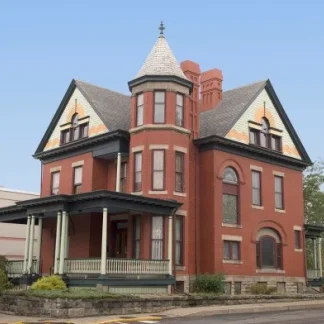MedMark Treatment Centers
MedMark Treatment Centers is a CARF-accredited alcohol and drug rehab center in ...
West Virginia Sober Living operates a series of homes that offer structure and support for those recovering from drug and alcohol addiction. West Virginia Sober Living is located in Morgantown, West Virginia.
Contact us for more information: (304) 413-4300

Connect with West Virginia Sober Living by calling their admissions team directly.
(304) 413-4300 Website Get DirectionsGroup therapy is any therapeutic work that happens in a group (not one-on-one). There are a number of different group therapy modalities, including support groups, experiential therapy, psycho-education, and more. Group therapy involves treatment as well as processing interaction between group members.
Life skills trainings involve all the skills a person must have in order to function successfully in the world. These include time management, career guidance, money management, and effective communication. Truly successful addiction recovery is based on the ability to not only live substance-free, but to thrive. Life skills teaches the practical necessities of functioning in society, which sets clients up for success in life, and therefore sobriety.
Recreational therapy (aka therapeutic recreation) uses creative and fun activities to help with addiction recovery. Recreational therapists lead patients in entertaining and engaging activities like sports or games; art (drawing, painting, sculpture); drama, music, and dance; and/or community outings (field trips) to improve patients' physical, social, and emotional well-being.
Life skills trainings involve all the skills a person must have in order to function successfully in the world. These include time management, career guidance, money management, and effective communication. Truly successful addiction recovery is based on the ability to not only live substance-free, but to thrive. Life skills teaches the practical necessities of functioning in society, which sets clients up for success in life, and therefore sobriety.
Recreational therapy (aka therapeutic recreation) uses creative and fun activities to help with addiction recovery. Recreational therapists lead patients in entertaining and engaging activities like sports or games; art (drawing, painting, sculpture); drama, music, and dance; and/or community outings (field trips) to improve patients' physical, social, and emotional well-being.
Recreational therapy (aka therapeutic recreation) uses creative and fun activities to help with addiction recovery. Recreational therapists lead patients in entertaining and engaging activities like sports or games; art (drawing, painting, sculpture); drama, music, and dance; and/or community outings (field trips) to improve patients' physical, social, and emotional well-being.
MedMark Treatment Centers is a CARF-accredited alcohol and drug rehab center in ...
Chestnut Ridge Center, located in Morgantown, West Virginia, provides mental hea...
Alcoholics Anonymous (AA) is a non profit rehab located in Morgantown, WV. Alcoh...
United Summit Center is a non-profit rehab located in Morgantown, West Virginia....